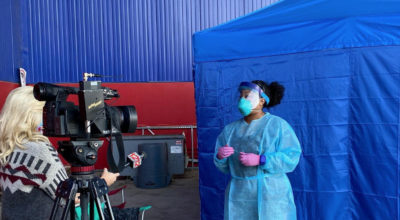
Gov. Bill Lee and Hamilton County health administrator Becky Barnes insist in public statements that wearing chin diapers reduces risk and spread of the so-called Covid-19 flu. But these claims are rebutted by the Centers for Disease Control in a 2020 study in its Emerging Infectious Diseases journal, Vol. 26, No. 5, which says as regards face masks:
‘No signifiant reduction’
Figure 2. Meta-analysis of risk ratios for the effect of face mask use with or without enhanced hand hygiene on laboratory-confirmed influenza from 10 randomized controlled trials with >6,500 participants. A) Face mask…
In our systematic review, we identified 10 RCTs that reported estimates of the effectiveness of face masks in reducing laboratory-confirmed influenza virus infections in the community from literature published during 1946–July 27, 2018. In pooled analysis, we found no significant reduction in influenza transmission with the use of face masks (RR 0.78, 95% CI 0.51–1.20; I2 = 30%, p = 0.25) (Figure 2). One study evaluated the use of masks among pilgrims from Australia during the Hajj pilgrimage and reported no major difference in the risk for laboratory-confirmed influenza virus infection in the control or mask group (33). Two studies in university settings assessed the effectiveness of face masks for primary protection by monitoring the incidence of laboratory-confirmed influenza among student hall residents for 5 months (9,10). The overall reduction in ILI or laboratory-confirmed influenza cases in the face mask group was not significant in either studies (9,10). Study designs in the 7 household studies were slightly different: 1 study provided face masks and P2 respirators for household contacts only (34), another study evaluated face mask use as a source control for infected persons only (35), and the remaining studies provided masks for the infected persons as well as their close contacts (11–13,15,17). None of the household studies reported a significant reduction in secondary laboratory-confirmed influenza virus infections in the face mask group (11–13,15,17,34,35). Most studies were underpowered because of limited sample size, and some studies also reported suboptimal adherence in the face mask group.
Disposable medical masks (also known as surgical masks) are loose-fitting devices that were designed to be worn by medical personnel to protect accidental contamination of patient wounds, and to protect the wearer against splashes or sprays of bodily fluids (36). There is limited evidence for their effectiveness in preventing influenza virus transmission either when worn by the infected person for source control or when worn by uninfected persons to reduce exposure. Our systematic review found no significant effect of face masks on transmission of laboratory-confirmed influenza.
We did not consider the use of respirators in the community. Respirators are tight-fitting masks that can protect the wearer from fine particles (37) and should provide better protection against influenza virus exposures when properly worn because of higher filtration efficiency. However, respirators, such as N95 and P2 masks, work best when they are fit-tested, and these masks will be in limited supply during the next pandemic. These specialist devices should be reserved for use in healthcare settings or in special subpopulations such as immunocompromised persons in the community, first responders, and those performing other critical community functions, as supplies permit.
In lower-income settings, it is more likely that reusable cloth masks will be used rather than disposable medical masks because of cost and availability (38). There are still few uncertainties in the practice of face mask use, such as who should wear the mask and how long it should be used for. In theory, transmission should be reduced the most if both infected members and other contacts wear masks, but compliance in uninfected close contacts could be a problem (12,34). Proper use of face masks is essential because improper use might increase the risk for transmission (39). Thus, education on the proper use and disposal of used face masks, including hand hygiene, is also needed.



The mask or face diaper is simply the 2020 version of the arm band worn by adherents to the National Socialist German Workers Party.
So if you want to be fully obedient, when greeting others hold your hand over your heart and say “Hail Victory”. English or German is OK.
John,
So, in other words, Mr. Tulis donned a swastika in order to attend his court hearing? My daughter donned a swastika to enter a hospital?
You have the right to disagree with mask usage, but let’s not make absurd statements regarding their moral significance.